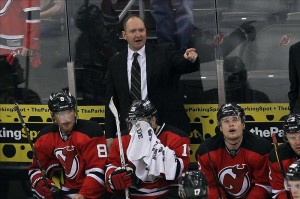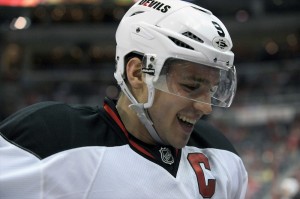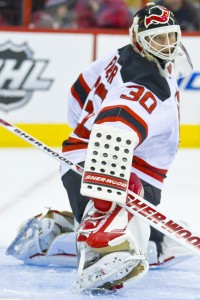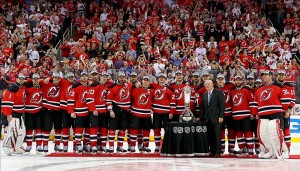In the chorus of his 1974 hit song “My Eyes Adored You” Frankie Valli, proud son of Newark and world famous crooner, sings, “So close, so close and yet, so far away.” Undoubtedly a tribute to some long lost love of his, Valli’s words are also a fitting eulogy to the bittersweet season completed by the hockey club that resides just a few miles from his birthplace in the North Ward.
When the 2011-12 season began, the New Jersey Devils were an organization in flux. Major changes, stemming from the disastrous “MacLean Era” and subsequent re-retirement of savior Jacques Lemaire, had come to Newark. A new head coach, Peter DeBoer, had been hired in July and as the preseason started with a matchup vs. the New York Rangers in Albany on September 21, many wondered how DeBoer, with his pedestrian level of success in his only previous head coaching stint with Florida, was going to get this team back to the playoffs. There were questions all over the roster, including whether Ilya Kovalchuk would once again become an elite scorer, whether Zach Parise would be the same after missing almost an entire season with a knee injury, who would replace Travis Zajac as the top-line center, and who would be the named team Captain. Oh, and there was talk about the 39 year-old goaltender being way past his prime. DeBoer appeared to have his work cut out for him.

In his first major decision at the Devils helm, DeBoer handed Zach Parise the captaincy on October 5, just before the season opener, stating:
“When you look at Zach as a coach, this guy plays the right way. He prepares the right way. He handles himself the right way. There are really not a lot of flaws in his character or in how he plays the game.”
As the regular season got underway on October 8, with New Jersey dropping a 3-0 contest to the Flyers, it was evident that the Atlantic Division was stacked with talent and there would be a dogfight for playoff position.
“That’s a great hockey club,” Martin Brodeur said after the opener. “There’s no doubt about that. They’ll be in the top four teams of our conference, for sure.”
Defenseman Adam Larsson, the team’s first-round draft choice in 2011, suited up for his NHL debut that night, and the New Jersey fans were excited that he could turn into the next great Devils blueliner.
On October 27, General Manager Lou Lamoriello made a seemingly minor move, claiming journeyman center Ryan Carter off waivers from the Florida Panthers. At the time, the move appeared to be insignificant, but Carter would eventually pay huge dividends, proving once again that Lamoriello’s eye for talent is second to none.
DeBoer was faced with his first challenge early in the season as Martin Brodeur, who would turn 40 in the spring, injured his shoulder making a diving save vs. Los Angeles on October 13 and missed several games. Thankfully, Lamoriello had brought Johan Hedberg back for another season, and “Moose” stepped in and did the job while Marty healed. Brodeur was activated from injured reserve on October 31, with the Devils sitting on a medicore 4-4-1 record.
New Jersey went on to win three of the next four games, as rookie center Adam Henrique began to emerge as a special player. DeBoer, shuffling lines as he searched for the right fit until Zajac returned from an Achilles injury, placed Henrique between Kovalchuk and Parise, and the rookie began to show playmaking ability.
As December began, the Devils were struggling to stay over .500, playing at a 12-10-1/25-point clip. On December 13, Lamoriello made the first of several in-season trades, sending Rod Pelley, Mark Fraser and a 2012 seventh-round draft pick to Anaheim for defenseman Kurtis Foster and goaltender Timo Pielmeier. Foster’s acquisition was seen as a move to bolster the point on the power play.
On December 16, the Devils honored former defenseman Scott Niedermayer in a pregame ceremony, retiring his #27. Niedermayer’s number was the third in franchise history to be retired, joining Ken Daneyko’s and Scott Stevens’ in the Prudential Center rafters. The event was jam-packed with sentiment, personalities and footage going back to the Devils Cup-winning glory days. Fans in Newark were nostalgic and hungry for a return to the franchise’s winning ways.
As the New Year dawned, the Devils were beginning to climb into serious contention in the Eastern Conference, sitting at sixth in the playoff race with 43 points. They ended the calendar year winners of three of their last four, including a 3-1 victory over the Penguins on New Year’s Eve that featured an Ilya Kovalchuk penalty-shot goal. There was a feeling that the team was beginning to gel as 2012 was ushered in.
“I think as a unit when we’re going out there, we look like we feel more comfortable with each other knowing what to expect,” said goaltender Martin Brodeur after the New Year’s Eve win.
As the team pushed ahead into January a unique problem on the power play continued. The Devils had begun allowing shorthanded goals at an alarming rate, culminating with their 12th shorthander allowed in a loss to Ottawa on January 2.
“I don’t have the answer,” DeBoer saidat the time. “It’s not something you can practice. We’ve done a lot of video on it. We’ve made the players aware of it. There’s been a concerted effort to take more of a conservative approach in some situations.”

In the midst of the shorthanded goal controversy, DeBoer showed glimpses of the leadership that would guide the Devils to the Finals later in the season. DeBoer weathered the questions and second-guessing with the consistency, calm and confidence of a man firmly in charge.
“You remind me every day of that,” he said of the constant questioning about the power play. “I understand that. It’s my job to also recognize that we’re doing a lot of good things. We’re getting points. We’ve got a lot of good things going on, too. So, that’s my job as a coach to juggle the good and the bad.”
The shorthanded goal situation and the inconsistency on the power play led to Lamoriello making another trade on February 24, acquiring puck-moving defenseman Marek Zidlicky from the Minnesota Wild for Kurtis Foster, Nick Palmieri, Stephane Veilleux and draft picks. The Zidlicky trade brought stability and veteran presence to the Devils blue line, with the defenseman playing a big role down the stretch and into the playoffs.
Like a surgeon–no, more like some sort of hockey ‘mad scientist’–Lamoriello was surgically removing pieces and adding others to this team, patiently and shrewdly building a unit that was fueled by chemistry and fluid teamwork on the ice.
As the Spring stretch run began, New Jersey was in the hunt for a playoff slot. On March 1, they were firmly entrenched as the sixth seed in the Eastern Conference, with a 35-23-5 record, good for 75 points. Despite their record, the East was jammed with contenders and they would have to play well if they were going return to the postseason in 2012.
They did exactly that.
The Devils registered 22 points in the month of March, clinching a playoff spot on March 31 with a 5-0 route of the Carolina Hurricanes. The win was Martin Brodeur’s 119th career shutout and New Jersey’s third win in a row. They would win the remaining three contests to end the regular season with a six-game win streak.
On April 6, the night before the Devils closed out the regular season vs. Ottawa, forward Stephen Gionta was called up from Albany. Gionta subbed for the injured David Clarkson in the regular season finale, scoring his first NHL goal in the win. It was a feel-good story, the undersized kid brother of former Devil (and current Canadiens captain) Brian Gionta getting a shot at the big time. At the time, no one could have known what a huge part of the playoff run the little guy with the huge heart would play.
At the conclusion of the regular season, several questions that were so prevalent before the season started had been answered. Zach Parise was back, playing in all 82 games and recording 31G 38A for 69 points while displaying the leadership and poise expected of a captain. Ilya Kovalchuk netted 37 goals and registered 83 points, while Martin Brodeur proved he still had a lot in the tank by starting 59 games and logging a 2.41 GAA.
There were pleasant surprises during the regular season, too. David Clarkson, coming off the worst season of his NHL career in 2010-11, more than tripled his goal output, netting 30 with 16 assists, becoming one of three 30-goal scorers on the team. Adam Henrique, who would be named a finalist for the Calder Trophy, also emerged as a player with a huge upside, scoring 16 goals along with 35 assists. As good as he was in the regular season, Henrique was saving even bigger contributions for the playoffs, though. Veteran Petr Sykora, out of the NHL since 2010, chipped in an impressive 21 goals and 23 assists. Not bad for a guy who made the team while in camp on a tryout basis. Finally, the team’s penalty kill unit also set an NHL record, turning in an astounding 89.6% performance.
With all the questions answered and nice surprises the regular season brought, new ones cropped up as the Devils prepared to take on the Florida Panthers in the opening round of the playoffs. Could Ilya Kovalchuk win in the postseason? Did DeBoer possess the tactical and leadership characteristics to lead a team under the immense pressure of the Stanley Cup Playoffs? How far could the team ride a soon-to-be 40 Martin Brodeur?
The experts all agreed: Kovalchuk was playoff Kryptonite, DeBoer would wilt under the pressure, Brodeur was old and tired. Boy, were they wrong. All of them.
The Devils certainly didn’t change a lot of minds in the early stages of the first round, as they were soundly beaten in Game 2 and blew a 3-0 lead in Game 3 on home ice, falling behind 2 games to one. The critics were out in full force.
New Jersey wasn’t dead yet, though. Brodeur responded with a masterful 4-0 shutout in Game 4, evening the series. It was short lived, as Florida won Game 5 with a shutout of their own, placing the Devils backs against the wall. It wouldn’t be the last time during the playoffs they would be in that position.
The remaining two games both went to overtime, with Travis Zajac winning Game 6 and Adam Henrique winning Game 7 in double overtime. It had been gut check time for the boys from New Jersey, and they had answered the bell. In spades.
Next up were the mighty Philadelphia Flyers, who logged 103 points in the regular season and dispatched the Pittsburgh Penguins in a tough first round series. Again, most “experts” gave New Jersey no chance to win the semifinal series.
A funny thing happened on the way to the Devils’ funeral, though. After dropping Game 1 to Philly in overtime, the Devils steamrolled the Flyers in four straight behind the solid play of Brodeur, an emerging fourth line of Carter, Gionta and Steve Bernier and a ferocious forecheck that frustrated and wore out their opponents. They moved on to face their arch rivals, the New York Rangers.
By the time the Conference Finals began on May 14, the New Jersey Devils could no longer be simply ignored by the NHL experts and commentators. They had reached the final four and would battle the Rangers, the top team in the East during the regular season, for a berth in the finals. But just because they couldn’t be ignored doesn’t mean they couldn’t be underestimated, as everyone from coast to coast seemingly picked New York to make quick work of the underdog Devils.

It was a matchup that ignited the tri-state area and conjured up images of a long-ago series in which three words: “Matteau! Matteau! Matteau!“, are all that is necessary to stir emotions on both sides of the Hudson.
Just like in the Flyers series, New Jersey dropped Game 1, shut out in a masterful performance by Henrik Lundqvist. The Devils bounced back in the second game, with Ilya Kovalchuk scoring a key goal, as the Russian sniper was already well on his way to exorcising the demons that proclaimed he couldn’t win in the postseason. Ryan Carter also added a goal, as his fourth line continued to overachieve in the playoffs.
New Jersey was blanked again by Lundqvist in Game 3, but rebounded to tie the series in Game 4 with a 4-1 win that appeared to turn the tide of the series. The New Jersey forecheck, so relentless during the playoff run, finally frustrated the Rangers to the point where they lost their composure, culminating in Mike Rupp’s sucker punch of Brodeur and a confrontation between Rangers coach John Tortorella and Pete DeBoer.
New Jersey took a three-games-to-two lead with a 5-3 win in Game 5, as fourth-liners Gionta and Carter chipped in a goal each, and it appeared the Devils had the series won in Game 6 as they jumped out to a 2-0 lead in the first period. The Rangers rallied to tie it and eventually send it to overtime, where Adam Henrique was the hero again. For the second time in the playoffs, the rookie center scored a series-winner in overtime, crushing the Rangers hopes for a Cup and finally banishing the ghosts of ’94.
Heading into the Stanley Cup Finals, there was one last hill to climb. Gone was the talk of Ilya Kovalchuk being a selfish player who couldn’t win or come up big in the playoffs. No longer were so-called expert analysts claiming that Martin Brodeur was too old to make a deep playoff run. Peter DeBoer had earned everyone’s respect as a coach and a leader of men. But that still didn’t mean anyone was picking New Jersey to win. Not against a Los Angeles juggernaut that had shredded their way through the best the Western Conference had to offer. From the top-seeded Canucks to the powerful Blues to the surprising Coyotes, the Kings had beaten them all, winning 12 and losing just 2.
Games 1 and 2 went to overtime, with the bounces simply not going the Devils’ way. But in the playoffs, you have to make your own luck, and New Jersey failed to convert on multiple opportunities in both games. Jonathan Quick was outstanding, as was his counterpart in the New Jersey net, but in the end, the Kings won both games in Newark in overtime by 2-1 scores. Heading to Los Angeles, the Devils were down two-games-to-none.
Game 3 was a dominant effort by the Kings, as they shut out the Devils 4-0. It was Quick’s third shutout of the postseason, and it appeared the magic had finally run out on New Jersey. Fans in L.A., most of whom didn’t start paying attention to the Kings until the Lakers were eliminated from the NBA playoffs, got out their brooms and prepared for a sweep.
But just as they had done all postseason, the Devils dug deep, grinding out a tough 3-1 win at Staples Center in Game 4 as Adam Henrique netted the game-winner in the third. There would be no sweep, and the series shifted back across the country to north Jersey.
Game 5 was again a grinding, gritty win for the Devils, as Zach Parise and Bryce Salvador (whose offensive production was another unexpected bonus for the team during the postseason) netted goals in the 2-1 victory. Suddenly the pressure appeared to be on the Kings, who suffered their first back-to-back losses in the 2012 playoffs. There was even talk of the 1942 Toronto Maple Leafs and their feat of coming back from a 3-0 deficit to win the Cup, the only time that was ever accomplished. The series headed back to Los Angeles for Game 6 and New Jersey, left for dead only days prior, was now playing with house money. They believed they had a shot to tie the series.

It all came crashing down at 10:10 in the first period of the scoreless Game 6. Steve Bernier, part of the fourth line that was so clutch throughout the playoffs, laid a vicious hit on Rob Scuderi, leaving the Kings defenseman bloodied on the ice. Bernier received a 5-minute major and a game misconduct while Los Angeles responded by scoring three goals during the penalty, effectively ending the game before the first intermission. L.A. added three more later, just for good measure, en route to a 6-1 win and the franchise’s first Stanley Cup.
It was a bitter disappointment for the Devils and their fans, as the momentum had unmistakably shifted in their favor through Games 4 and 5 and they were playing the Kings to a stalemate in Game 6 until the Bernier disaster. It was a crushing way to end such a magical playoff run, one that no one would have predicted when they first stepped on the ice in Albany over eight months before.
“We have to be really proud of what we accomplished, not just in the series but in the whole playoffs,” said Martin Brodeur after the Game 6 loss. “We came a long way after not making the playoffs last year to be able to challenge for a Stanley Cup. I’m really proud of what we accomplished as a group.”
With the season over and the summer heat setting in, the focus now moves to next season and personnel, namely Zach Parise and Martin Brodeur. Both will be unrestricted free agents as of July 1, and their status could be complicated by New Jersey’s troubled financial situation. Brodeur, now 40 years old, has repeatedly said he’d like to play next season, while Parise has been tight-lipped about his plans for next year and beyond.
Regardless of what happens with Parise and Brodeur, it will be a long time before we see a group band together using grit, determination, hard work and a passion for winning like we saw in this Devils squad. The unique ability of stars and role players alike to step up and be heroes was something special in Newark this season. They were greater than the sum of their parts and they gave us one of the most exciting seasons in franchise history. They were truly, in a word, a team.